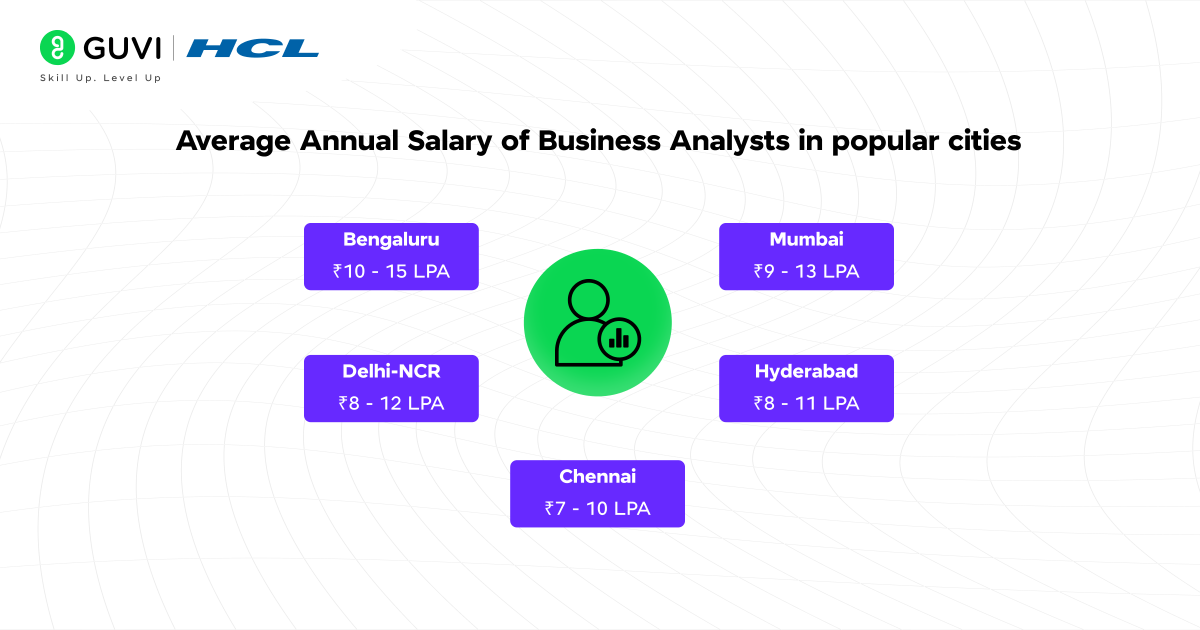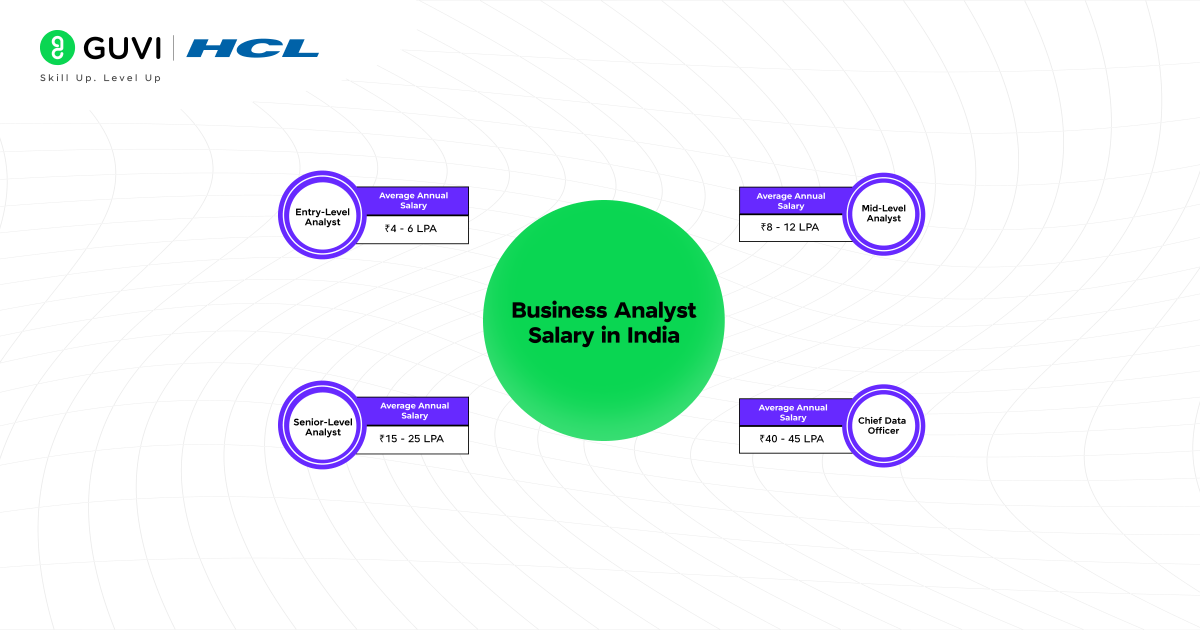
Business Analytics Salary in India: A Comprehensive Guide
Apr 18, 2025 6 Min Read 2094 Views
(Last Updated)
In today’s fast-paced, data-driven world, Business Analytics is where the action is. It’s not just another career path; it’s the key to unlocking strategies, boosting efficiency, and predicting what’s next for businesses. From startups to global giants, everyone’s riding the Business Analytics wave to stay ahead. So, what’s in it for you?
Well, besides the cool factor of working with data, it’s one of the highest-paying gigs out there! Curious about what a Business Analytics salary in India looks like? Let’s dive into the numbers and see what makes this field so rewarding.
Table of contents
- What is Business Analytics?
- Why Business Analytics is a High-Demand Career
- Data Explosion
- Cross-Industry Applications
- AI and Machine Learning Integration
- Remote Work Opportunities
- Strategic Decision-Making Power
- Factors Influencing Business Analytics Salary in India
- Experience
- Skillset
- Industry
- Geographic Location
- Education and Certifications
- Role-Specific Salaries in Business Analytics
- Business Analyst
- Data Analyst
- Data Scientist
- Business Intelligence (BI) Analyst
- Growth Potential in Business Analytics
- Entry-Level Analyst:
- Mid-Level Analyst:
- Senior Analyst:
- Managerial Roles:
- C-Suite Roles: Leading at the Top
- Steps to Improve Your Business Analytics Salary
- Upskill Regularly
- Network and Engage
- Gain Industry-Specific Expertise
- Wrapping Up
- Frequently Asked Questions
- What is the average salary for a Business Analyst in India?
- What skills can boost my salary as a Business Analyst?
- What industries offer the highest-paying Business Analytics jobs?
- What is the highest-paying role in Business Analytics?
What is Business Analytics?
Business Analytics is all about turning raw data into actionable insights that drive smarter decisions. It’s the process of using tools, techniques, and statistical models to analyze data, uncover trends, and solve real-world business problems. Whether it’s improving customer experiences, optimizing operations, or forecasting market trends, Business Analytics helps organizations make data-backed decisions that give them a competitive edge. It’s the perfect blend of data, tech, and business strategy!
Why Business Analytics is a High-Demand Career
The field of business analytics has seen exponential growth in recent years, and it’s not slowing down anytime soon. Here’s a closer look at why this career path is in such high demand:
1. Data Explosion
Companies need professionals who can handle, process, and analyze this data efficiently.
Every second, businesses around the globe generate massive amounts of data from customer purchases to social media interactions. However, data alone isn’t valuable unless analyzed and interpreted effectively. That’s where business analysts come in. They help organizations make sense of this flood of information, turning it into actionable insights that drive decision-making.
2. Cross-Industry Applications
The ability to pivot into different industries makes analytics a versatile and recession-proof career. Business analytics is not limited to one industry, it’s a universal need. From healthcare to e-commerce, every sector leverages analytics to optimize processes, enhance customer satisfaction, and stay competitive.
3. AI and Machine Learning Integration
As businesses adopt AI and machine learning, business analytics has become more critical than ever. These technologies rely heavily on data modeling and insights generated by analysts to function effectively. Analysts are the backbone of these advanced systems, ensuring their accuracy and reliability.
4. Remote Work Opportunities
The flexibility and access to a global talent pool make this career path appealing to many. The shift to a digital-first approach has erased geographical boundaries in the job market. Business analytics roles, heavily reliant on cloud-based tools and software, are perfectly suited for remote work setups.
5. Strategic Decision-Making Power
In a world driven by competition, the ability to make strategic, data-backed decisions is a game-changer. Business analysts empower organizations to predict market shifts and adapt proactively, improve operational efficiency, reduce costs, and enhance customer experiences with tailored solutions.
Factors Influencing Business Analytics Salary in India
When it comes to business analytics salaries, multiple factors play a significant role in shaping how much professionals earn. Here’s a deep dive into these determinants:
1. Experience
Your experience in the field of business analytics directly impacts your earning potential. Employers value the expertise and problem-solving abilities that come with years on the job.
Why It Matters: Experience enables professionals to handle complex datasets and business challenges, justifying higher pay.
2. Skillset
The tools and technologies earned by a professional can significantly affect salary levels. Employers actively seek candidates with expertise in programming, visualization, and advanced analytics tools.
| Skill | Impact on Salary |
| Python & R Programming | High |
| SQL and Database Management | Moderate |
| Machine Learning | Very High |
| Data Visualization (Power BI, Tableau) | High |
| Predictive Modeling & AI | Very High |
Proficiency in Python and SQL is considered foundational, while skills in machine learning and AI can catapult earning potential. Also, acquiring certifications in tools like Tableau or Power BI further enhances prospects.
Why It Matters: Skill diversity and advanced technical know-how are valued across industries, resulting in better pay.
3. Industry
The choice of industry can significantly influence earning potential and career growth. The dependency on data insights varies from industry to industry, which is reflected in their salary offerings.
| Industry | Average Salary (INR) |
| IT & Software | ₹10-15 LPA |
| Banking & Finance | ₹12-18 LPA |
| Healthcare | ₹8-12 LPA |
| Retail & E-commerce | ₹10-14 LPA |
| Manufacturing | ₹7-10 LPA |
4. Geographic Location
The cost of living and demand for analytics professionals in different cities also play a big role in determining salaries. Geographic location directly affects access to job opportunities and cost-of-living adjustments, influencing net pay.

5. Education and Certifications
Employers value professionals who continually upskill, and certifications validate expertise in specific tools and methodologies. A strong educational background and relevant certifications can set you apart and boost business analytics salary prospects.
| Certification | Impact on Salary |
| Microsoft Power BI Certification | High |
| Google Data Analytics Certification | Moderate |
| Advanced Machine Learning Certifications | Very High |
You Might Like: 10 Best Websites to Learn Business Analytics in India
Role-Specific Salaries in Business Analytics
Each business analytics role comes with its unique job description, required expertise, and salary potential. Below is a breakdown of the most prominent roles in business analytics, their descriptions, and why they are in demand.
1. Business Analyst
Business Analysts act as the bridge between business needs and technological solutions. They analyze business processes, identify gaps, and recommend data-driven solutions to improve efficiency and achieve strategic goals. Their role often involves gathering requirements, creating reports, and ensuring that the business benefits from implemented solutions.
Key Responsibilities:
- Requirement gathering and stakeholder communication.
- Performing gap analysis and recommending improvements.
- Generating actionable insights through data interpretation.
- Collaborating with technical teams for solution implementation.
| Why In Demand? | With organizations striving to stay competitive, business analysts help them understand market dynamics and optimize operations, ensuring a steady demand for this role. |
| Top Companies Hiring | TCS, Accenture, Deloitte |
| Average Annual Salary | INR 7.1 Lakhs |
2. Data Analyst
Data Analysts focus on collecting, cleaning, and analyzing large datasets to identify trends, patterns, and correlations. They play a critical role in transforming raw data into meaningful insights, which aid in decision-making across various departments.
Key Responsibilities:
- Data cleaning and preprocessing.
- Generating reports and dashboards using tools like Tableau and Power BI.
- Conducting statistical analyses to uncover trends.
- Presenting findings to stakeholders in an understandable format.
| Why In Demand? | As data becomes a central asset for businesses, data analysts are integral to unlocking its potential. Their ability to translate complex data into actionable business strategies makes them invaluable. |
| Top Companies Hiring | Infosys, HCL, Wipro |
| Average Annual Salary | INR 6.4 Lakhs |
3. Data Scientist
Data Scientists are specialists who use advanced statistical, analytical, and machine-learning techniques to solve complex business problems. They often build predictive models, develop algorithms, and create AI-based solutions to uncover insights that aren’t immediately visible in raw data.
Key Responsibilities:
- Designing and deploying machine learning models.
- Extracting patterns and trends from unstructured datasets.
- Collaborating with cross-functional teams to implement AI solutions.
- Driving innovation by leveraging big data tools and techniques.
| Why In Demand? | Data Scientists combine technical expertise with business acumen, making them critical for companies looking to leverage AI and predictive analytics for a competitive edge. |
| Top Companies Hiring | IBM, Microsoft, Google |
| Average Annual Salary | INR 14.7 Lakhs |
4. Machine Learning Engineer
Machine Learning Engineers specialize in designing and implementing machine learning systems that automate decision-making processes. They work closely with Data Scientists to develop models, optimize algorithms, and ensure the scalability of solutions.
Key Responsibilities:
- Building, testing, and deploying machine learning models.
- Ensuring the scalability and performance of AI systems.
- Integrating machine learning models into existing systems.
- Fine-tuning algorithms to achieve maximum accuracy.
| Why In Demand? | With the rise of AI applications in sectors like e-commerce, healthcare, and finance, machine learning engineers play a pivotal role in building intelligent systems that drive business growth. |
| Top Companies Hiring | Amazon, Flipkart, Paytm |
| Average Annual Salary | INR 10.6 Lakhs |
5. Business Intelligence (BI) Analyst
Business Intelligence Analysts specialize in converting raw data into meaningful insights through interactive dashboards and detailed reports. They help businesses track performance metrics and make data-driven strategic decisions.
Key Responsibilities:
- Developing and maintaining BI dashboards and visualizations.
- Analyzing data to provide insights into market trends and business performance.
- Collaborating with stakeholders to determine reporting needs.
- Ensuring data accuracy and integrity in BI tools.
| Why In Demand? | With businesses increasingly relying on data visualization to make quick, informed decisions, BI Analysts are essential in ensuring that decision-makers have the right information at their fingertips. |
| Top Companies Hiring | EY, KPMG, PwC |
| Average Annual Salary | INR 8.9 Lakhs |
Growth Potential in Business Analytics
One of the most attractive aspects of a career in business analytics is its tremendous growth potential. As businesses across industries increasingly rely on data-driven decision-making, professionals in this field find themselves on a clear and rewarding career trajectory. Here’s a breakdown of what growth in business analytics typically looks like:

1. Entry-Level Analyst:
This role is crucial in preparing datasets and providing preliminary insights that inform larger business strategies. With experience, you’ll move into more specialized or advanced analytical roles within 2-3 years.
2. Mid-Level Analyst:
At this stage, you’ll delve into advanced analytics, create predictive models, and deliver meaningful insights through interactive dashboards. Effective communication with stakeholders to understand their requirements becomes a vital part of this role. A Mid-level analyst plays a pivotal role in driving operational efficiencies and strategic decisions by converting complex data into actionable business recommendations.
3. Senior Analyst:
As a senior analyst, your responsibilities extend beyond data analysis. You’ll lead analytics projects, mentor junior analysts, and work closely with executives to inform long-term strategies. You’ll shape the organization’s direction by driving data-backed decisions and aligning analytics projects with broader business objectives.
4. Managerial Roles:
Transitioning into managerial roles, you’ll oversee teams of analysts and data scientists, manage project timelines, and ensure alignment with organizational goals. Building data governance frameworks and ensuring the integrity of data systems is part of your role.
You’ll further act as the bridge between analytics teams and upper management, ensuring data initiatives drive tangible business outcomes.
5. C-Suite Roles: Leading at the Top
Reaching the C-suite as a Chief Data Officer (CDO) or Chief Analytics Officer (CAO), you’ll lead the organization’s data strategy, oversee large-scale data transformations, and pioneer innovation in analytics practices. Your decisions will shape the company’s long-term vision, ensuring it stays competitive in a data-driven world.
Steps to Improve Your Business Analytics Salary
If you’re aiming to maximize your earning potential as a business analyst, proactive efforts toward professional development and industry engagement are key. Here’s how you can take your career and salary to the next level:
1. Upskill Regularly
Organizations are always seeking analysts who can implement innovative solutions to drive decision-making processes.
Dedicate a few hours each week to business analytics courses with professional certifications from reputed platforms. Professional certifications not only validate your skills but also position you as an expert in specific areas of business analytics.
Also, professionals with recognized certifications often command higher salaries, as they bring validated and structured skills to the table.
2. Network and Engage
Your network can be as valuable as your skillset when it comes to career growth. Networking not only enhances your visibility but also opens up mentorship opportunities and access to exclusive job postings. Employers value referrals, which can sometimes bypass traditional recruitment processes.
So, attend industry-specific events such as Big Data & Analytics Summits or Business Intelligence Forums. Join communities like LinkedIn groups focused on analytics. Leverage webinars and meetups to interact with thought leaders and industry experts.
3. Gain Industry-Specific Expertise
Tailoring your analytics skills to a particular industry can make you a niche expert, which often comes with higher compensation. Industries often prefer analysts who understand their unique challenges and can deliver industry-specific insights without a steep learning curve.
| High-Demand Industries and Skills | |
| Finance | Skills in financial modeling, risk analysis, and regulatory compliance. |
| Healthcare | Proficiency in patient outcome analysis, predictive health trends, and regulatory frameworks like HIPAA. |
| Retail and E-commerce | Expertise in inventory optimization, demand forecasting, and customer segmentation. |
| Manufacturing | Knowledge of supply chain analytics and operational efficiency modeling. |
Wrapping Up
Business analytics isn’t just a career; it’s a dynamic and rewarding journey packed with endless possibilities. In India, the demand for skilled analysts means competitive salaries and exciting growth opportunities at every step. The key? Keep learning, gain real-world experience, and stay ahead of industry trends.
As data becomes the ultimate game-changer in decision-making, business analysts are taking center stage and this is your chance to be part of it. So, if you’re ready to ride the data wave and build a future-proof career, now’s the time to dive in.
Frequently Asked Questions
The average salary for a Business Analyst in India ranges from ₹6-10 LPA, depending upon industry, experience, and skills.
Skills like Python, SQL, Machine Learning, Data Visualization (Tableau, Power BI), and predictive modeling can significantly boost your salary.
Industries like IT, Banking, Finance, and Healthcare tend to offer the highest-paying Business Analytics jobs, with salaries ranging from ₹10-18 LPA.
Roles like Data Scientists, AI Analysts, and Machine Learning Engineers typically offer the highest salaries, ranging from ₹10-40 LPA depending on expertise.































Did you enjoy this article?